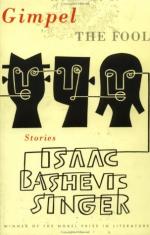|
This section contains 1,752 words (approx. 6 pages at 300 words per page) |

|
SOURCE: Fraustino, Daniel V. “‘Gimpel the Fool’: Singer's Debt to the Romantics.” Studies in Short Fiction 22, no. 2 (spring 1985): 228-31.
In the following essay, Fraustino argues that the major themes of “Gimpel the Fool” were drawn from the poetry of the Romantic period.
“Gimpel the Fool” is generally regarded as Isaac Bashevis Singer's greatest fictional masterpiece and for good reason. Its appeal to the reader is personal and immediate. Gimpel, the narrator-protagonist, represents that child-like quality in all of us which is the source of both our humanity and our vulnerability: the need to believe in the people around us and in the credibility of our own experiences. Singer's story is about Gimpel's search for manifest truth, or as Sol Gittleman declares, “for the nature of truth in reality.”1 While Gimpel's quest has obvious precedent in many literatures throughout the world, it has a special debt to the literature...
|
This section contains 1,752 words (approx. 6 pages at 300 words per page) |

|


